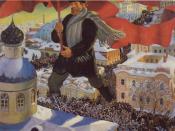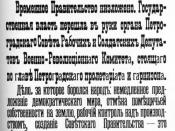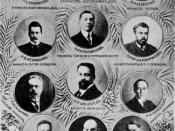The October Revolution was the second part of the Russian Revolution and the result was a communist state. This revolution, the first Marxist communist revolution of the twentieth century, was led by Vladimir Lenin and the Bolshevik party. The Bolshevik Revolution was caused by the initial weaknesses of the Provisional Government and the sudden rise of Bolshevik power. Therefore, the Bolshevik Revolution was both Lenin's success and Kerensky's failure.
Although the Provisional Government was welcomed with open arms, it still had little support. The new Provisional Government had not been elected; most of its members were previously part of the Duma. Its power was limited by the Petrograd workers' and soldier's council, otherwise known as the soviet. The Petrograd Soviet published an "Order Number 1" which stated that members of the soviet should follow rules set forth by the Provisional Government as long as they did not contradict any of their own orders.
The Soviet was more liked by the people because it consisted of elected officials. They had control over public transportation, troops and means of communication. The Provisional Government made promises to create a general amnesty, give the people civil liberties and a constituent assembly elected by universal suffrage but nothing was actually done. The soviet demanded the government give them peace; the demonstrations were so intense the foreign minister resigned in May.
The Provisional Government was weak and unpopular. When it was finally attacked, no one was willing to defend or protect it. It was unable to satisfy the people's demands for better lives; the Provisional Governments decision to continue fighting World War I which contributed to its unpopularity. They allowed their opposition to rise and the soviets crippled them. The Provisional Government was unorganized, the opposite of the Bolshevik Party, and divided. They did not agree...


